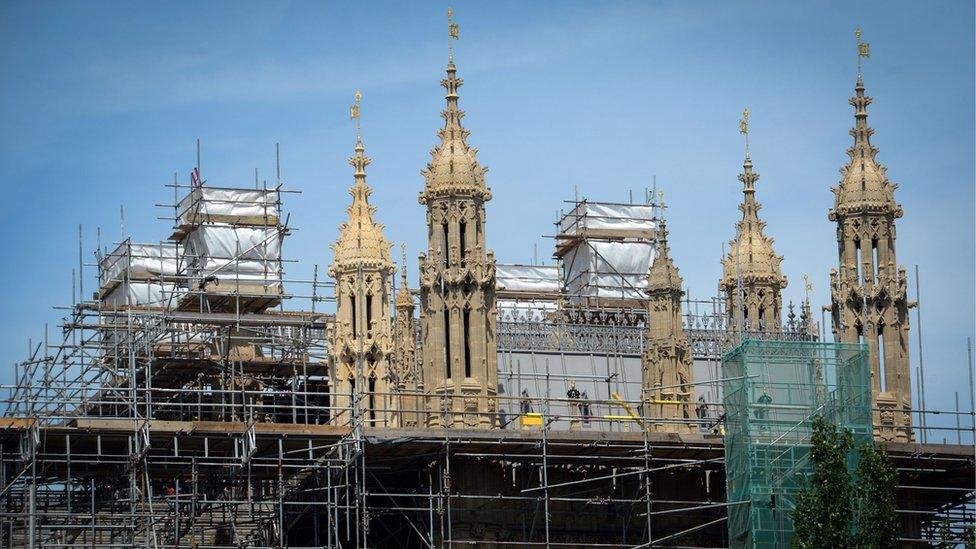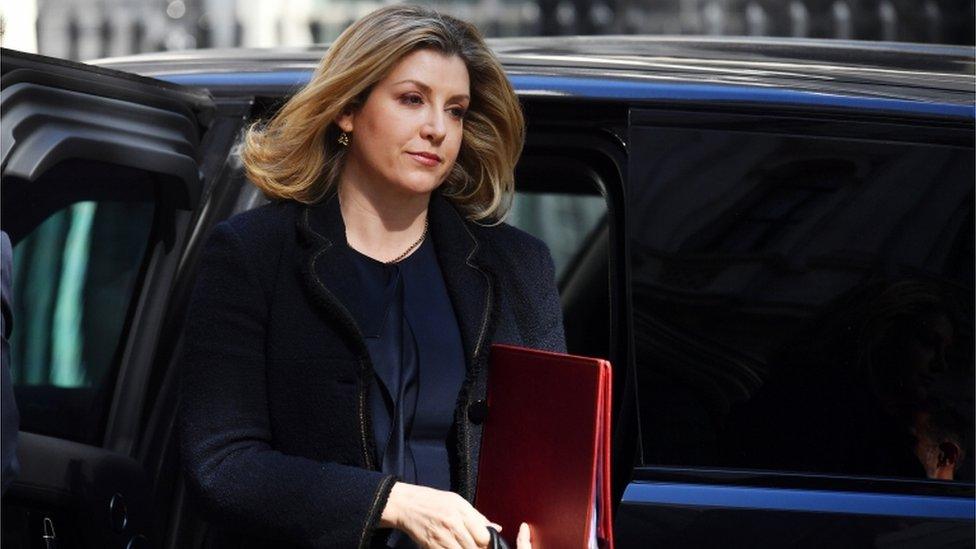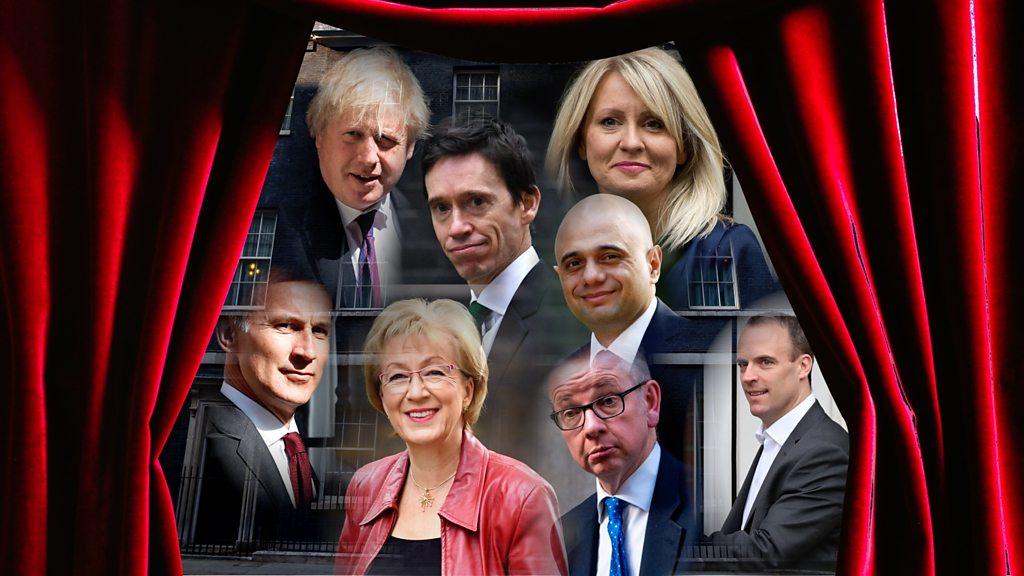Week ahead in Parliament
- Published

Events beyond the SW1 post code will be driving politics this week, with many MPs hitting the campaign trail rather than lingering in Parliament.
Will the results (which are not revealed until Sunday) be a political game-changer, creating some kind of momentum for some kind of Brexit progress?
Or will they simply allow the various factions to dig themselves deeper into their respective bunkers?
The actual parliamentary agenda is thin, even by recent standards, but could allow possible opportunities for Conservative leadership contenders to strut their stuff.
Watch out for Penny Mordaunt taking defence questions on Monday, Andrea Leadsom announcing parliamentary business on Thursday, and any aspiring leaders who might find themselves making a statement or answering an urgent question.
The one fairly chewy item on the agenda will be the Parliamentary Buildings (Restoration and Renewal) Bill, which sets up the structure needed to deliver the multi-billion pound restoration of the Victorian Palace of Westminster.
This covers bureaucratic matters like the delivery authority which oversees the actual work, and the sponsor board which is the "client" feeding in the views of the parliamentarians who will be the end-users of the revamped building.
But with light whipping, plenty of MPs elsewhere, and a certain queasiness about the sums to be spent on the project, it is possible that those opposed to the whole idea might attempt some strike against it.
There is, however, quite a bit of significant select committee action.
Monday 20 May

Penny Mordaunt became the UK's first-ever defence secretary earlier this month
The Commons opens (14.30 BST) with Defence Questions, when Penny Mordaunt will make her first appearance at the dispatch box in her new role as defence secretary (and possible leadership contender). Urgent questions and ministerial statements may follow.
Interestingly, the main legislative action is the committee stage of the Non-Domestic Rating (Preparation for Digital Services) Bill.
I say interestingly because this is a short, non-controversial measure about modernisation of tax collection and providing online payment and account facilities, and the committee stage for such measures is not normally taken by the whole House. Maybe the expectation is that that the committee stage can be knocked off pretty quickly, but it does seem to smack of padding out a thin agenda.
As does the presence of a backbench business debate on a Monday afternoon (the normal slot is on Thursday) - but the subject, medical cannabis under prescription, is a serious one.
Conservative ex-minister Mike Penning wants to explore why, despite government promises to make cannabis-derived medicines available in cases where they are the only effective treatment, patients are still finding it difficult to access them. Mr Penning led the parliamentary campaign to highlight the plight of the seven year-old epileptic boy, Alfie Dingley, for whom cannabis oil was the only effective treatment.
In Westminster Hall (16.30 BST), the Petitions Committee has scheduled a debate on an e-petition which urges the government to provide immunity from prosecution to troops who served in Northern Ireland.
The chair will not allow them to discuss cases that are active in the courts, so the debate will focus on the general principle of granting immunity.
In response to the petition, the government says: "This Government is unequivocal in our admiration for the Armed Forces, whose sacrifices ensured terrorism would never succeed. However, our approach to the past must be consistent with the rule of law. Criminal investigations and prosecutions are a matter for the police and prosecuting authorities who act independently of government and politicians."
My committee pick is the Housing, Communities and Local Government evidence session (16.00 BST) on the Resources and Waste Strategy for England, which aims to minimise waste, promote resource efficiency and move towards a so-called circular economy.
In the Lords (14.30 BST), the half-hour question time will see Conservative peer Lord Dobbs, who once attempted to pilot a private member's bill for an EU referendum through the House, ask about establishing a royal commission or equivalent inquiry to examine "lessons to be learnt from the 2016 European Union referendum and subsequent events".
The rest of the day is devoted to a series of statutory instruments, external, with a couple targeted by "regret motions" - one on exceptions to the Rehabilitation of Offenders Act 1974 is attacked by Labour's Baroness Chakrabarti because it would allow for spent convictions and cautions to be disclosed to all future public inquiries, which, she says, risks undermining rehabilitation and a person's private life.
The second is the Transport Act 1985 (Amendment) Regulations - which the Lib Dem Baroness Randerson argues should have waited on the outcome of the judicial review of the Department for Transport's current position on community transport. She also argues the regulations do not contain sufficient detail, given their impact on community transport operators.
Tuesday 21 May
MPs begin their day with Treasury Questions (11.30 BST), followed by a ten-minute rule bill, external from the Conservative former cabinet minister Maria Miller, who now chairs the Women and Equalities Select Committee. Her bill aims to prohibit making employees redundant during pregnancy, maternity leave, or six months from the end of a pregnancy.
The main business is the second reading debate on the Parliamentary Buildings (Restoration and Renewal) Bill (see above).
In Westminster Hall, subjects for debate include financial exclusion and the future of access to cash (9.30 BST) and intimidation in public life (14.30 BST) - this is Conservative MP Simon Hart following up on the report of the Committee on Standards in Public Life, which found a sharp rise in instances of intimidation.
On the committee corridor, the Education Select Committee (10.00 BST) winds up its inquiry into special educational needs and disabilities with evidence from the Children's Minister Nadhim Zahawi and the School Standards Minister Nick Gibb.
The discussion is expected to cover the implementation of changes made in the 2014 Children and Families Act, the assessment process for Education Health and Care Plans (EHCPs), and post-19 provision and tribunals. This has been one of the biggest select committee inquiries of recent years, with evidence taken from 70 witnesses plus around 500 written evidence submissions.
At 10.30 BST, the Digital, Culture, Media and Sport Committee session with Sharon White, chief executive of the broadcasting regulator Ofcom, will give members their first chance to probe the issues relating to the demise of the Jeremy Kyle show, and the wider issue of the way participants in reality TV programmes are treated.
Finally, the joint committee scrutinising the Draft Domestic Abuse Bill (10.45 BST) rounds off its inquiries by questioning the two key ministers involved: Victoria Atkins, the Home Office minister for safeguarding and vulnerability, and Edward Argar from the Ministry of Justice.
In the Lords (14.30 BST), peers will ponder the detail of the Kew Gardens (Leases) (No. 3) Bill (which extends the lease for the Royal Botanical Gardens), and then debate a committee report on UK foreign policy.

The bill will empower ministers to grant Kew Gardens a lease for up to 150 years
Wednesday 22 May
The Commons opens (11.30 BST) with Northern Ireland questions, which may well see auditions by a few MPs aspiring to succeed Andrew Murrison as chair of the Northern Ireland select committee, following his appointment as a minister at the Foreign Office. Watch out for Conservatives Simon Hoare, Mark Pritchard and Maria Caulfield, and maybe Nigel Mills, flourishing their plumage.
As ever, the winning candidate will be the one who attracts the most support from beyond their own party (under the carve-up of committees agreed after the last election, the NI committee can only be chaired by a Conservative MP).
Then comes Prime Minister's Question Time (12.00 BST), which has become an increasingly listless affair over recent weeks. Once, the chamber used to be packed for what was the central confrontation of the Westminster week...now it is part empty to start with, and MPs increasingly drift away after the exchanges between the PM and Jeremy Corbyn. Maybe the notice of Theresa May's impending departure will draw them back in...
The day's ten-minute rule bill, from Labour's Toby Perkins, is the Unauthorised Encampments Bill, which would seek to make it illegal for travellers (or anyone else) to demand money to leave a site. This follows a couple of incidents in his Chesterfield constituency when, he says, travellers demanded cash to leave a site they were occupying illegally.
After that, the main business is two opposition day motions from Labour, on social mobility and inequality, picking up from Jeremy Corbyn's line of questioning in last week's PMQs, and on racism in sport.
In Westminster Hall, subjects for debate include disclosure of information in pre-trial abuse of process hearings (11.00 BST), and the financial and ethical risks of investment in fossil fuels (14.30 BST).
At 16.00 BST, Sarah Champion, the chair of the all-party parliamentary group on adult survivors of child sexual abuse will be calling for the creation of a new fund to transform the government's response to the issue. It follows their recent report charting the experiences of survivors in accessing support services and the criminal justice system.
My committee corridor pick is the rather grim-sounding Work and Pensions evidence session on Universal Credit and "survival sex" (09.30 BST) which will examine fears that delays and reductions in UC payments are forcing women into sex for money.
This is a subject raised by independent MP Frank Field, who chairs the committee, at a departmental scrutiny session last year - and he remains concerned. The inquiry will hear from support services and organisations representing sex workers.
In the Lords (15.00 BST) the main event is a debate on the role of the devolved administrations in the governance of Scotland, Wales and Northern Ireland.
Thursday 23 May
It's European Parliament election day - and many MPs may be elsewhere, attempting to get out the vote.
But for those in Westminster, the action begins at 09.30 BST with Digital, Culture, Media and Sport Questions, followed by questions to the Attorney General (which will also include a dispatch box debut in her new role for the new Solicitor-General Lucy Frazer QC).
Next is the weekly Commons Business Statement from the Leader of the House, Andrea Leadsom, where the main point of interest will be the timing for debate on the Withdrawal Agreement Bill - which the Government has promised will be put before MPs in the week after their Whitsun Recess.
The main debates are on subjects chosen by the Backbench Business Committee, starting with a debate on the Yemen peace process led by Labour MP Keith Vaz. The motion points to the increasing death toll from the continuing war in the country, and calls on the government to take every possible measure to support peace-making efforts and to provide humanitarian aid.
Then comes a general debate on "matters to be raised before the forthcoming adjournment", which provides MPs with an opportunity to make a speech on any subject that takes their fancy.
The final Commons event before the mini-recess is an adjournment debate on excessive speeding and driving bans, led by Labour's Susan Elan Jones.
In Westminster Hall, Conservative MP Chris Green leads a debate on supporting clinical trials and the UK's future clinical research capability (13.30 BST).
In the Lords (11.00 BST), there is a debate on the potential conflict between the right of members to speak freely in Parliament and the obligation under the rule of law to obey court orders, led by former Supreme Court judge Lord Brown of Eaton-under-Heywood.
This could well touch on Labour peer Lord Hain's decision to break a court order banning the naming of a businessman accused of misconduct. That is followed by a debate on the case for increasing the social value of public procurement by aligning it with the government's Civil Society Strategy.
After that, MPs and peers depart for their Whitsun Recess, returning on Tuesday 4th June.
- Published13 July 2020

- Published28 May 2019

